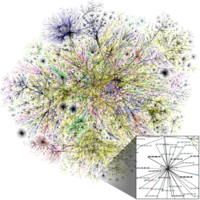
Photo from wikipedia
During the last years, the growth of wireless traffic pushed the wireless community to search for solutions that can assist in a more efficient management of the spectrum. Toward this… Click to show full abstract
During the last years, the growth of wireless traffic pushed the wireless community to search for solutions that can assist in a more efficient management of the spectrum. Toward this direction, the operation of long term evolution (LTE) in unlicensed spectrum (LTE-U) has been proposed. Targeting a global solution that respects the regional regulations worldwide, 3GPP has published the LTE licensed assisted access (LAA) standard. According to LTE LAA, a listen before talk (LBT) procedure must precede any LTE transmission burst in the unlicensed spectrum. However, the proposed standard may cause coexistence issues between LTE and Wi-Fi, especially in the case that the latter does not use frame aggregation. Toward the provision of a balanced channel access, we have proposed mLTE-U that is an adaptive LTE LBT scheme. According to mLTE-U, LTE uses a variable transmission opportunity (TXOP), followed by a variable muting period. This muting period can be exploited by co-located Wi-Fi networks to gain access to the medium. In this paper, the system model of the mLTE-U scheme in coexistence with Wi-Fi is studied. In addition, mLTE-U is enhanced with a Q-learning technique that is used for autonomous selection of the appropriate combinations of TXOP and muting period that can provide fair coexistence between co-located mLTE-U and Wi-Fi networks. Simulation results showcase the performance of the proposed model and reveal the benefit of using Q-learning for self-adaptation of mLTE-U to the changes of the dynamic wireless environment, toward fair coexistence with Wi-Fi. Finally, the Q-learning mechanism is compared with conventional selection schemes showing the superior performance of the proposed model over less complex mechanisms.
Journal Title: IEEE Access
Year Published: 2018
Link to full text (if available)
Share on Social Media: Sign Up to like & get
recommendations!